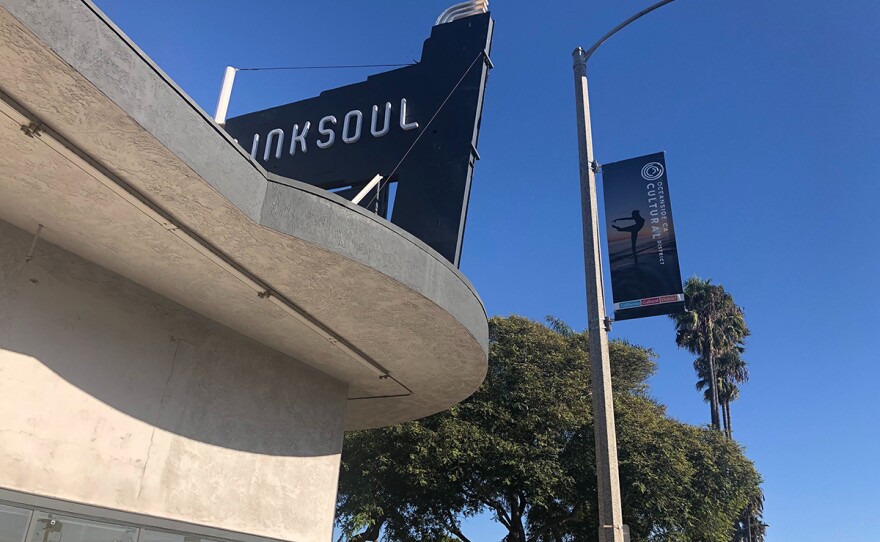Dinah Poellnitz opened the Oceanside art space Hill Street Country Club eight years ago, with a mission of sharing the “personal, communal and universal” through art. Hill Street has become a bastion for art and building community and equity for black artists, Latinx artists and people of color, working class artists and the DIY arts movement.
This current moment, the Black Lives Matter upheaval layered atop a pandemic, has hit hard.
"If art is personal, communal, universal, what are my experiences right now? I'm a black woman, I am a single mom, I live in a multigenerational home," Poellnitz said. Avoiding COVID-19 exposure is critical for her right now. No collaborating or opening the gallery, but also no marching or protesting in crowds.
But being a black woman, a single mother and living in a multigenerational home means her worry is rooted in systemic inequity.
"That means that I want human rights, I want police to go to jail. I mean, I would like to have maybe affordable housing so I don't have to live in a multigenerational home. I have children; that's a childcare issue and an education issue," she said. "Maybe that's where I need to be right now as an art space. I need to use my cultural influence to help convey these messages on how we all connect on these communal and universal issues. It's my goal to encourage and influence artists who can be in the streets to continue to be in the streets, because there's a greater vision to all this."
To Poellnitz, whether art can make a difference in a time of upheaval is a function of art being a common thread. "I think art is just a language to be honest. And when I say it's a language, I think it's how some of us who are vulnerable and normally can't speak out loud and proud, or if we aren't loud and proud, it's an opportunity for us to convey our vulnerabilities," she said.
There’s a serendipity to the timing: We're all stuck at home right now and turning to the internet and social media for everything during this protest movement. "The art spaces are no longer in downtown Oceanside for me. It's on my phone," she said.
She added that Blackout Tuesday, the viral campaign to post a black square in solidarity with black oppression in the music industry, was "the most annoying thing ever.”
The controversy — critics called out the act as either performative or harmful, flooding the critical wellspring of information, organizing and fundraising in the #BlackLivesMatter hashtag — shone a spotlight on the value of social media for the black movement right now, as well as communities of black artists: "Our screen time is now our intimate time," she said. “This is our social circle.”
Poellnitz has watched black artists across the world rise in recent years, but was wary it was a trend that didn’t yet have the institutional structure to back it up.
But lately, she’s somewhat hopeful. "How are we going to keep this ongoing to the point that we're no longer a trend, that we are art. Like, we're making art that's a representation of what we want to make as an artist. Not because we're just black, but because this is what I create. And you're gonna buy it because it's good art, not because it's black art in this trend,” she said.
“Now we're going into this next era for art which is so interesting, because black art is no longer a trend. Now we're teaching each other to appreciate black art, to include black art, to recognize black art, to sit down and learn from black art.”
As for the art that's inspiring her right now, as Black Lives Matter protests sweep the country with tremendous public visibility, Poellnitz taps into some of that vulnerability she values in art. "Dude, I'm not even really looking at art right now. I'm being really honest. I'm not really looking at art anymore," she confessed.
But she quickly added, "I'm literally looking at the artists who are marching the streets right now. I'm looking at Johnny Nguyen, Alejandro Martinez, Carmela ... I'm looking at artists who actually take their work off their f---ing canvas and out of their photographs into an action," said Poellnitz.

While she cannot take to the streets herself, her own work with Hill Street Country Club continues. She talks with artists often, envisioning projects and curating works. This summer, a group of students from CSU San Marcos will exhibit their "Reuse Project" waste and environmental art in the gallery, with plans for window viewing, gallery appointments and programming.
Despite the massive upheaval facing artists right now, Poellnitz insists that art never stops. "We're not on pause. Art's in a different form right now. It's all conceptional, it's all conversational. It's a communal project. It's a social practice right now," she said.







